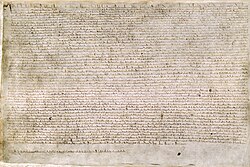
Back Bryttisc Grundriht ANG دستور المملكة المتحدة Arabic Канстытуцыя Вялікабрытаніі Byelorussian Конституция на Обединеното кралство Bulgarian ब्रिटिश संबिधान Bihari Storbritanniens forfatning Danish Σύνταγμα του Ηνωμένου Βασιλείου Greek Constitution of the United Kingdom English Constitución del Reino Unido Spanish قانون اساسی بریتانیا Persian

The Constitution of the United Kingdom is a set of laws and rules in the United Kingdom that governs how the country is organized and the basic rights and freedoms of the people.
The UK's constitution is not written in one single document like many other countries' are. In fact, the UK's constitution is not completely written down at all. Some of it can be found in writing, starting with Magna Carta of 1215 and the Bill of Rights Act 1689 and including more modern Acts of Parliament. Other parts of it are considered common law and are made up of the decisions of judges over many hundreds of years in a system called legal or judicial precedence. Because of this, some people say that the United Kingdom has a de facto or "unwritten" constitution.[1]
Using the word "unwritten" is a problem, because most British laws and rules are written as statutes, or court judgments, the law of equity and in various treaties. Most of these laws come from the Parliament of the United Kingdom. Because most of the constitution is written down in this way, it is not technically correct to call it "unwritten" or "de facto". However, these words are still used. The Constitution of the United Kingdom of Great Britain and Northern Ireland is even more different to most other constitutions in that it is just a normal set of laws, and not a "higher" law that the government cannot easily change. The constitution has no more authority than any other law in the UK, and the government can change it just by passing a new Act.
- ↑ Barnett, H. (2005). Constitutional and Administrative Law (5 ed.). London: Cavendish. p. 9.
Conversely, "A written constitution is one contained within a single document or a [finite] series of documents, with or without amendments", id.
© MMXXIII Rich X Search. We shall prevail. All rights reserved. Rich X Search